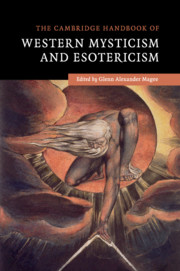Book contents
- Frontmatter
- Dedication
- Contents
- Acknowledgments
- Editor's Introduction
- List of contributors
- I ANTIQUITY
- II THE MIDDLE AGES
- III THE RENAISSANCE AND EARLY MODERNITY
- IV THE NINETEENTH CENTURY AND BEYOND
- 20 Spiritualism
- 21 H. P. Blavatsky and Theosophy
- 22 Rudolf Steiner and Anthroposophy
- 23 The Golden Dawn and the O.T.O.
- 24 G. I. Gurdjieff and the Fourth Way
- 25 C. G. Jung and Jungianism
- 26 René Guénon and Traditionalism
- 27 Via Negativa in the Twentieth Century
- 28 Contemporary Paganism
- 29 The New Age
- V COMMON THREADS
- Suggestions for Further Reading
- Index
- References
25 - C. G. Jung and Jungianism
from IV - THE NINETEENTH CENTURY AND BEYOND
Published online by Cambridge University Press: 05 May 2016
- Frontmatter
- Dedication
- Contents
- Acknowledgments
- Editor's Introduction
- List of contributors
- I ANTIQUITY
- II THE MIDDLE AGES
- III THE RENAISSANCE AND EARLY MODERNITY
- IV THE NINETEENTH CENTURY AND BEYOND
- 20 Spiritualism
- 21 H. P. Blavatsky and Theosophy
- 22 Rudolf Steiner and Anthroposophy
- 23 The Golden Dawn and the O.T.O.
- 24 G. I. Gurdjieff and the Fourth Way
- 25 C. G. Jung and Jungianism
- 26 René Guénon and Traditionalism
- 27 Via Negativa in the Twentieth Century
- 28 Contemporary Paganism
- 29 The New Age
- V COMMON THREADS
- Suggestions for Further Reading
- Index
- References
Summary
Life and Work
Carl Gustav Jung, the founder of analytical psychology, left behind a life's work that has significant implications for spiritual and religious matters. Jung's writings are often studied by readers who are less interested in professional psychology than in self-understanding. A large number of his writings fall under the rubric of esoteric literature.
Jung was born on July 26, 1875, the son of an Evangelical Reformed minister in the small town of Kesswil, within the Swiss Canton of Thurgau, on Lake Constance. After attending the gymnasium in Basel, he completed his studies in the natural sciences and medicine from 1895 to 1900 at the University of Basel. Jung's decision to devote himself to psychiatry afforded him the opportunity to link his interests in the natural and social sciences. As he reports in his 1962 autobiography Memories, Dreams, Reflections, already during his youth he was drawn to the world of the supersensible and transpersonal. Jung participated in spiritualist sittings with a medium (Helene Preiswerk, a member of his mother's family), which led to his 1902 doctoral dissertation, On the Psychology and Pathology of So-Called Occult Phenomena (Zur Psychologie und Pathologie sogenannter occulter Phenomena). Jung's time from 1900 to 1909 as an assistant and later chief physician at the psychiatric clinic at Burghölzli (under the direction of Eugen Bleuler) was of great importance to his later medical and psychotherapeutic practice. He studied briefly with Pierre Janet at the famous Salpetrière Clinic in Paris, but it was Sigmund Freud and psychoanalysis that were to make the most important impact on him. In his speaking and writing, Jung advocated for psychoanalysis, which, at the beginning of the century, was still controversial. However, within a few years he had set his own course and distanced himself from the Freudian school. His analytical psychology placed itself in opposition to psychoanalysis, beginning with a new model of psychological types.
In 1903, Jung married Emma Rauschenbach, the daughter of a Swiss industrialist, and started a family. Around the same time, he opened a highly successful private psychotherapy practice in Küsnacht, near Zurich. He also began publishing numerous works setting forth his theories. It was during this same time that Jung turned to mythology and to the mystical and gnostic traditions.
- Type
- Chapter
- Information
- The Cambridge Handbook of Western Mysticism and Esotericism , pp. 297 - 307Publisher: Cambridge University PressPrint publication year: 2016



